
Charu Lata directs the climate and clean energy work at NRDC India, focused on supporting and advancing India’s clean energy transition and leading NRDC India’s global climate engagement initiatives.
She focuses on issues including decarbonization, clean energy, and climate policy for India. Charu works at the national and state levels to improve energy access to vulnerable communities through climate-friendly technologies, the skilling ecosystem, and green jobs. Her work also supports designing robust policies and standards for green hydrogen. During her initial years with NRDC, Charu was instrumental in kickstarting NRDC India’s electric mobility work.
She has more than 15 years of experience in climate policy and clean energy, and has worked in various sectors on climate change mitigation and adaptation, including low-carbon transformation, electric mobility, energy policy, and energy efficiency.
Charu has previously worked with Ernst & Young and Bechtel Corporation on diverse sustainability and climate change projects. She is a Jubilee scholar with a Master’s in Sustainable Energy Systems from the University of Edinburgh, UK, and a Bachelor’s in Power Engineering from the National Power Training Institute, Ministry of Power, India
Related Publications

NRDC Analysis: Climate Action Can Improve Health in Rural India
February 6, 2025
This blog was coauthored by Dr. Ritika Kapoor and Charu Lata of NRDC India and Sameeha Hossain, a graduate student at the Yale School of Public Health.
Environmental health risks in India are widespread and climate change is worsening many of them. Stifling heat waves are becoming longer and more intense, rainfall patterns are becoming more erratic, and harmful ozone air pollution—already a threat to hundreds of thousands of people—is poised to worsen in a warmer world.
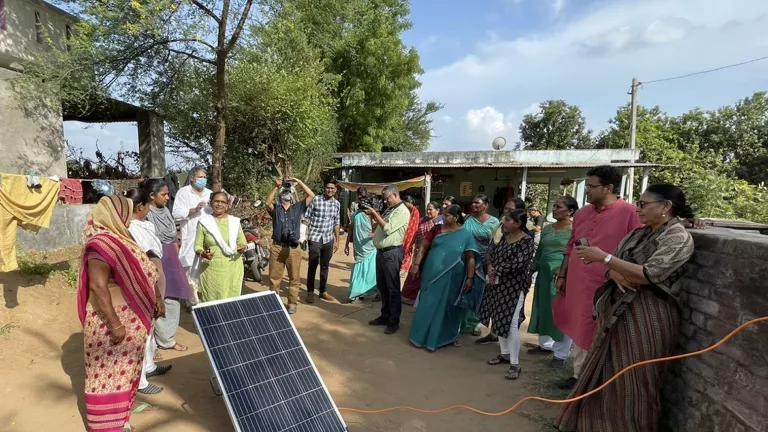
Gender Equity in India’s Clean Energy Transition
March 6, 2024
This blog has been co-authored by Dhilsha Jubair and Charu Lata of NRDC India
On this International Women’s Day, the role of women in advancing the clean energy transition in India is taking center stage. Women are disproportionately affected by the impacts of climate change, but can bring unique insights and invaluable perspectives that are crucial for building resilience to the multipronged challenge of climate change.
Ministry of New and Renewable Energy (MNRE) in association with Natural Resources Defense Council (NRDC) is organizing an event, Women in Renewable Energy: Inspiring Gender Inclusion Through Skill Development and Targeted Policies for Green Jobs.
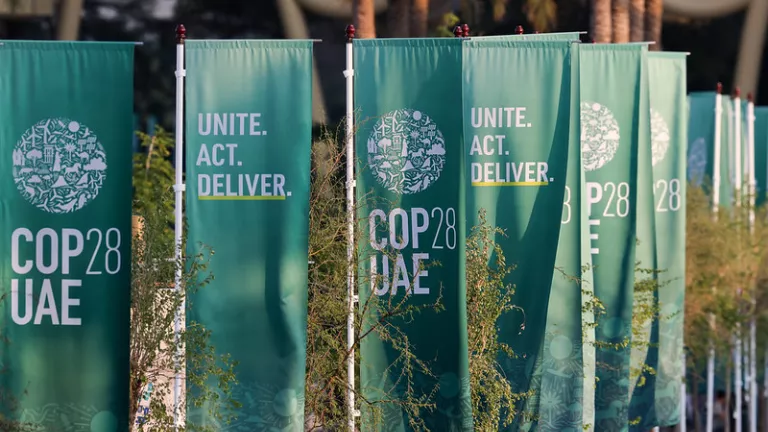
Raising the Profile for Women-led Subnational Climate Action
December 21, 2023
This blog is co-authored with Charu Lata, NRDC India.
The recently concluded COP28 climate talks in Dubai highlighted growing international consensus and commitments on accelerating the transition towards clean energy and away from fossil fuels. The summit opened with the operationalization of the Loss and Damage Fund, which will provide assistance to countries most vulnerable to and severely impacted by climate change. The summit concluded with the first Global Stocktake, an assessment of the global action on climate change with 198 nations coming together to craft a response.

NRDC at COP28: Taking Stock of Global Progress
November 29, 2023
This year, for the first time, countries will assess their collective progress toward meeting the goals of the Paris Agreement in a “global stocktake.” Experts have already shown that we are not on the road to a 1.5-degree Celsius future, which is where we need to be to avoid the worst impacts of the warming planet. So, this meeting will be the time for all actors—governments, companies, financial institutions, and more—to commit to the urgent actions we need to close the gap during this decisive decade.
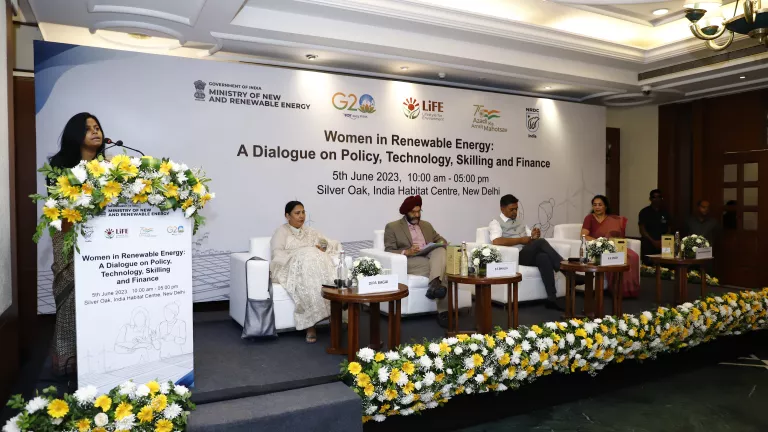
Building Synergies for a Women-led Clean Energy Transition in India
June 14, 2023
Co-Authored with Akanksha Golchha, Charu Lata and Srinivas Ethiraj of NRDC India
Women are disproportionately affected by the impacts of climate change and at the same time are capable of bringing more effective change at the grassroots level through community engagement and household level action. This was a key theme of discussion at the “Dialogue on Policy, Technology, Skilling, and Finance,” organized by India’s Ministry of New and Renewable Energy (MNRE), in association with NRDC India, on the occasion of the World Environment Day last week in New Delhi.
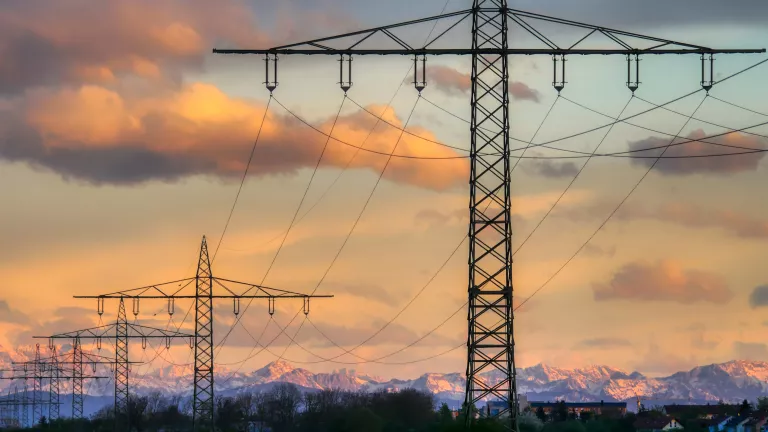
Utilities Vital to the Success of India’s EV Transition
June 6, 2023
Co-authored with Charu Lata, Sr. Program Lead - Clean Energy and E-Mobility, NRDC India
Over half of India’s three-wheeler registrations in 2022 were electric. Overall, electric vehicle (EV) sales in India in the first quarter of 2023 have already increased by 81 percent over the same period in 2022. With growing numbers of EVs on the road, the role of utilities is vital to sustain this momentum. Not only can utilities help provide charging infrastructure, but they can also be the interface in managing increased power demand from EVs and the electricity grid.
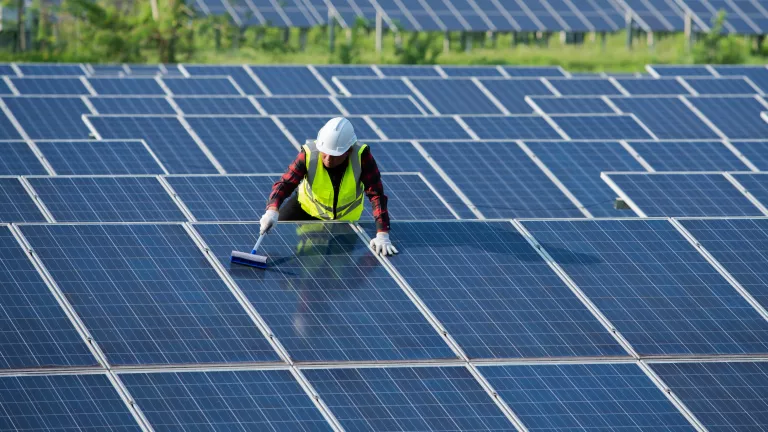
Renewable Energy: A Driver for Job Growth
February 6, 2023
Co-authored with Charu Lata, Akanksha Golchha, and Akanksha Tyagi
India's recently announced Union Budget highlights green growth as one of the priority areas acknowledging that renewable energy, in addition to providing energy security and environmental sustainability, can also generate large scale employment opportunities. A new report, India's Expanding Clean Energy Workforce - 2022 Update, released today by Natural Resources Defense Council India (NRDC India), Council on Energy Environment and Water (CEEW), and Skills Council for Green Jobs (SCGJ), presents market analyses and insights on green jobs growth in India and recommendations on how to best develop the renewable energy workforce of the future.

Mobilizing Renewable Energy for EV Charging in India
July 22, 2022
For many in India, driving an electric vehicle (EV) is part of living a “greener” life. However, the electricity used to charge EVs can often come from conventional fuels like coal and natural gas. Fortunately, the Green Energy Open Access Rules 2022 has the potential to mitigate against this quandary. The Open Access Rules, which the Ministry of Power notified in early June, enable consumers to purchase green energy (minimum 100 kilowatts) directly from renewable energy producers, paving the way to charging EVs using renewable energy in India.

Hariyali Green Villages: Women Lead Climate Solutions
June 14, 2022
NRDC, Self-Employed Women’s Association (SEWA), and partners have implemented the transformative Hariyali Green Villages initiative in 15 villages in Gujarat and Rajasthan over the past year. Navigating through the COVID-19 pandemic and natural calamities like cyclone Tauktae, the implementation has already benefitted over 300 families. A new report, “Hariyali Green Villages: Women-Led Climate and Clean Energy Solutions for Prosperity in Rural India,” with a preliminary assessment of the Hariyali Green Villages, was released today at a clean energy workshop in Anand district in Gujarat.

India Could Create Millions of Jobs Through Renewable Energy
January 27, 2022
In the past year, India has seen multiple waves in an ongoing pandemic, increases in extreme weather events including heatwaves, floods, droughts, growing economic instability, and a spotlight on global inequities: climate disasters are striking with increasing severity, often hammering places where people are already vulnerable.

India's New Climate Target Could Create 3.5 Million Jobs
November 09, 2021
Jobs are a major topic as nations gather during the Glasgow climate talks. Clean energy is proven to boost jobs in India and around the world. India’s stronger climate target announced last week sets the course to achieve the country’s employment ambitions and climate goals. Over 3.5 million jobs (short and long term) can be created by achieving India’s newly announced 500 gigawatts (GW) non-fossil electricity capacity goal by 2030, as discussed during an NRDC and partner session at COP26.

Clean Energy Skills for Women Entrepreneurs in India
July 27, 2021
For the millions in rural India striving to right their lives after the crushing impacts of the COVID-19 pandemic and the worsening climate crises, clean energy skills and trainings can be a lifeline. As NRDC and the Self-Employed Women’s Association’s (SEWA) research for the Hariyali Green Village Plans has revealed, entrepreneurial opportunities for women in villages can dramatically improve livelihoods while accelerating clean energy use and reducing poverty.

Gujarat Releases a Comprehensive EV Policy
June 22, 2021
The Indian state of Gujarat has launched a progressive and future-looking electric vehicles (EV) policy today. One out of every three passenger cars manufactured in India comes from Gujarat. The state’s announcement today will provide a fillip to the electric mobility ecosystem in the country.

A Ray of Hope to Bridge the Climate Divide
June 14, 2021
Creating 10 foot tall waves in the Arabian Sea, and lashing winds on land, Cyclone Tauktae devastated the western coast of India last month. Villages were flooded, buildings were destroyed, and more than 104 people lost their lives due to the cyclone—just one of the many extreme weather events that are getting more frequent and more intense due to climate change. The most vulnerable people, including millions in India already battling a deadly COVID-19 pandemic, face the worst impacts of climate change.

Unlocking the Billion-Dollar EV Opportunity for Gujarat
April 26, 2021
While COVID-19 is an immediate priority for India, actions to reduce harmful emissions such as by transitioning to electric mobility can achieve major wins for public health, for the environment, and for India’s economy. The state of Gujarat aspires to be an electric mobility hub and was one of the earliest states to draft an electric vehicles (EV) policy. Stakeholders are now calling upon the state to finalize and release the Gujarat EV policy to keep up with market trends as well as reap the economic, environmental, and societal benefits of a robust EV market.

Going Electric in India: EV Charging Station Locations
March 25, 2021
Big businesses in India are going electric. Amazon.com Indian unit recently said it will deploy close to a hundred electric three-wheeler vehicles made by Mahindra Electric in seven cities across the country. The move will help Amazon India meet its target of employing 10,000 EVs in its fleet of delivery vehicles by 2025.

Moving to Electric Mobility in Gujarat: Impacts, Benefits
February 26, 2021
With plans for new lithium-ion battery factories in Indian states, such as Gujarat, state electric vehicle (EV) policies are increasingly important to grow the nascent market. Electric mobility is an emerging priority for national and state governments in India and around the world. Shifting to electric vehicles is a major opportunity for economic and job growth, improved air quality, reduced carbon emissions. EV sales need to drastically increase to advance electric mobility in India by 2030.

Location and Siting of EV Charging Stations in Hyderabad
February 23, 2021
With chronic air pollution problems and to reduce greenhouse gas (GHG) emissions, states across India are shifting to electric vehicles (EV). Widespread and accessible public charging is needed to support robust EV use. Telangana in South India is leading the way in working with stakeholders to advance e-mobility, focused on charging infrastructure and more. A technical committee (part of the state-level EV Steering Committee) recently met in Hyderabad to discuss charging infrastructure as part of building codes and public chargers across the city.

Charging Ahead: Siting EV Charging Stations in Hyderabad
December 19, 2020
With a rapid transformation in electric mobility, over 15 states in India are moving forward with electric vehicle (EV) plans. Shifting to EVs also helps reduce India’s chronic air pollution problems and climate emissions while supporting COVID-19 economic recovering efforts. For the shift, a strong public charging system is needed to support robust EV use.

Moving Ahead with Electric Mobility in India
February 28, 2020
With 21 of the world’s 30 most polluted cities, electric mobility is a major opportunity to improve air quality in India. New Delhi, one of top polluted cities, recently announced its draft electric mobility policy. Leading automobile companies, utilities and states are getting more active on advancing electric mobility in India. Even the Indian Parliament is holding special session on electric mobility.

For EV Charging Infrastructure, Location Is Everything
January 30, 2020
India is set to bring nearly 3,000 electric vehicle (EV) charging stations online across the country starting this year and a new report released today focuses on the smartest places to put them. Increasing the fleet of EVs and charging infrastructure can be key to improving air quality in Indian cities, enhancing energy security (by reduced dependence on imported crude), and fighting climate change. To support robust EV growth and use, a strong public charging infrastructure is needed.

Advancing EV Charging in Key Indian States
December 10, 2019
Communities across India are inundated by dangerous air pollution levels. Dangerous levels of air pollution has led to more than 500,000 premature deaths in India, according to the recent Lancet Countdown 2019 on health and climate change report. A key solution to improving India’s air quality is to accelerate the transition to electric mobility. Two key states, Gujarat and Telangana are moving forward with finalized policies and engaging with stakeholders.

India Focus: Telangana Moves on Electric Mobility
September 04, 2019
With chronic traffic congestion and skyrocketing air pollution, leading states in India are looking to electric vehicles as a key solution. States, such as Telangana, are developing EV policies to work in parallel with the newly launched national EV and mobility policy, FAME II. The FAME II program allocates ₹10,000 crore ($1 billion) for capital subsidies to 2 and 3 wheeler EVs, vehicle fleets, and for EV charging infrastructure. This is just the start of the EV opportunity in India.

India Shifts Toward Electric Vehicles and Improved Mobility
July 16, 2019
With poor air quality and congested streets, India is moving toward electric vehicles and improved mobility. This month, the Indian government and key stakeholders are discussing ambitious targets for auto-rickshaws and two-wheelers. Earlier this year, the Faster Adoption and Manufacturing of (Hybrid &) Electric Vehicles (FAME-II) program was launched and aims to expand shared mobility, electric mobility and electric vehicles (EV).
